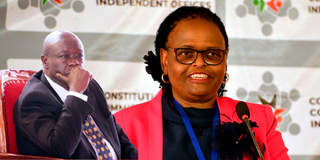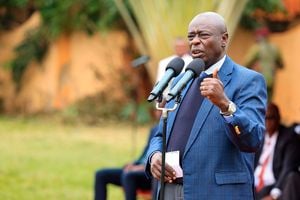
Deputy President Rigathi Gachagua and Chief Justice of Kenya, Martha Koome.
Deputy President Rigathi Gachagua now wants all the petitions seeking to stop his impeachment heard by a bench of more than two judges, arguing the issues they are raising are weighty and require constitutional interpretation.
Appearing before High Court judge Lawrence Mugambi, the DP through Senior Counsel Paul Muite submitted the court needs to pronounce itself on the question of public participation conducted by Parliament, which he said did not meet the required threshold.
Mr Muite said the threshold for the exercise should even be higher than that of a county governor given the stature of the Deputy President.
“Although the MPs exercised their delegated authority, the resolution to impeach the Deputy President should be interrogated by more than one judge. Kindly consider sending these matters to the Chief Justice (Martha Koome) so that we can argue each of them wholly not just for the sake of what is happening today, but to guide future cases,” he said.
Mr Muite said the petition raises undisputable weighty constitutional issues including Standing order which provides only 12 days to deal with the disposal of the impeachment of the Deputy President.
He added that public participation process was inadequate and members of the public gave their opinion after Parliament had already made a case against Mr Gachagua, prejudicing him.
According to Mr Muite, the DP was not given sufficient time to respond to the issues, which were put to the public to form a basis for his ouster and in his view, he should have been given at least 12 days to prepare for his defence.
National Assembly through lawyer Benson Millimo had already concluded its part of the process and presented its resolution to the Senate and if Mr Gachagua has any issues with procedure, he has an opportunity to defend himself in the trial chamber.
He said the question of public participation was a concluded matter and the court has no jurisdiction to determine the same at this stage.
According to Mr Millimo, once the issue of jurisdiction is raised, the court should determine the matter first before considering any other applications.
Lawyer Peter Wanyama opposed the matter being referred to the CJ saying the issue of public participation has been determined before and the matter can be handled by a single judge. He added that the issue was premature as the Senate had yet to pronounce itself on the impeachment.
Mr Paul Nyamodi for Senate revealed that so far, 22 cases have been filed in a bid to stop impeachment of Mr Gachagua and in his view, all the files should be taken before the principal judge of the High Court Eric Ogola and give directions as to the hearing of the cases.
The court will rule on the matter on October 11.
Mr Gachagua has challenged the process stating that it essentially seeks to overturn the sovereign will of the majority of Kenyans who voted for him to be the Deputy President on frivolous grounds, which do not meet the lawful test which justifies an impeachment.
He maintained that the process constitutes a very serious undertaking which requires to be conducted in accordance with the strict dictates and provisions of the constitution and the Parliamentary rules of procedure.
The exercise can only be conducted by an independent and impartial body, he said.
Mr Gachagua said the format of the “public views template” seeks to guide and circumscribe the content of the views and opinions participants can provide and the form has no way of verifying the true identity or even real existence of the " participants" since it has no requirement for “participants” to fill in any form of identification verification documents.
The DP will be seeking a declaration that for the purpose of impeachment of the President or Deputy President, public participation must be undertaken in all the 290 constituencies and the Diaspora, plus the 1,450 electoral wards where the presidential election took place.







